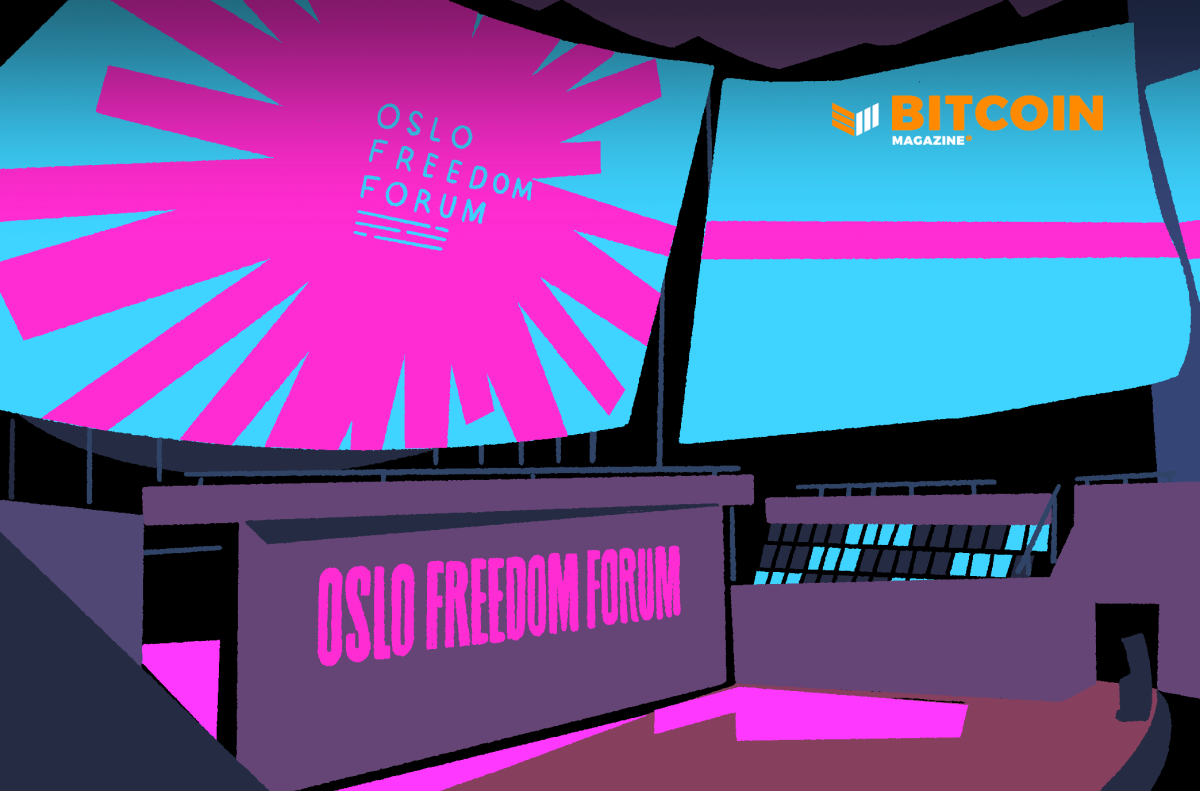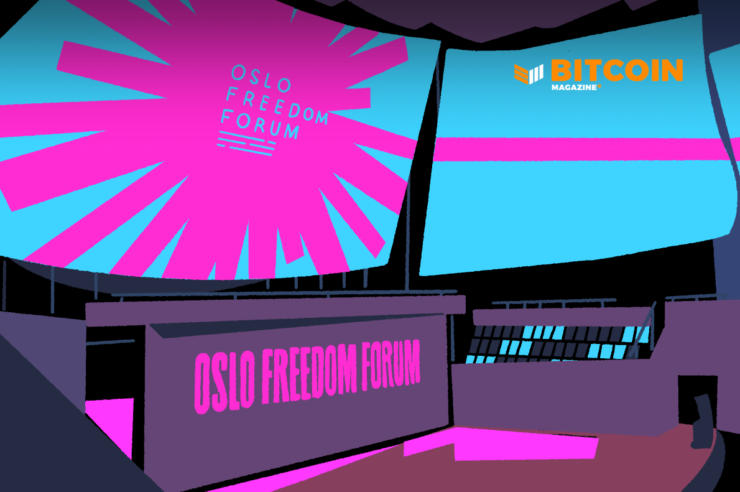
This year’s Oslo Freedom Forum, a human rights conference organized by the Human Rights Foundation (HRF), took place from May 23 to May 25, 2022. It’s a yearly conference bringing together more than a thousand activists, civil society leaders, scholars, artists, technologists, business leaders and journalists with the goal of exchanging strategies, forming partnerships and inspiring one another to continue the fight for liberty and democracy all over the world.
Less than 20% of humanity lives in full democracies while 54% of the global population live in countries with authoritarian regimes and dictatorships. This means 4.2 billion people are deprived of basic human rights, such as free speech, freedom of transaction, the right to equality and the right to own property. They are excluded from economic participation and have no access to tools that would allow them to save money or receive loans.
Since authoritarian regimes are more likely to devalue their local currencies, steal from their citizens or loot and freeze activist’s bank accounts, the HRF’s Alex Gladstein programmed a “Financial Freedom” track as part of this year’s conference.
Panels titled “Can Bitcoin Reach A Billion People?” and “Bitcoin, The Environment, And Human Rights,” as well as a full afternoon dedicated to a “Bitcoin Academy” — where the attendees learned how to install self-custodial wallets, to secure their money from confiscation and to fundraise with cryptocurrency — were all hosted as part of the event’s focus on Bitcoin as a way to institute financial freedoms. Speakers are seasoned Bitcoin advocates from a wide variety of domains like Lyn Alden, Jimmy Song, Elizabeth Stark, Hong Fang, Nic Carter, Jeff Booth, Matt Odell, Fodé Diop, Janine Roemer, Lisa Neigut, Abubakar Nur Khalil and Obi Nwosu, just to name a few.
As the focus in my Bitcoin work with Bitcoin for Fairness is its use as a tool against dictatorships and to bring fair access in emerging countries to an open monetary system, I was very honored that I was invited to be a part of this event by moderating a panel built around the question “Is Bitcoin Compatible With Democracy?“
The term “democracy” appeared first in Greek city-states, meaning “rule of the people,” in contrast to “aristocracy,” meaning “rule of an elite.” Bitcoin is built to be money from the people, for the people, where consensus about changes is needed from all participants in the network without the need for intermediaries, aka elites. Therefore Bitcoin is far more democratic than our current exclusive system of central banks and financial institutions and as such, it is the most democratic tool that we have as of today.
The question is, how is this tool being used and by which powers? How is education and knowledge going along with the interests of bigger players?
Farida Nabourema is a Togolese human rights activist and writer who has fought for democracy in Togo since she was a teenager.
Togo is a country with about nine million inhabitants, located between Ghana and Benin, and it has the oldest military regime in Africa, ruled by the same government and the same family since 1967. Money has been in the center of the struggle for change from dictatorship to a free Togo. Human rights activists and individuals have been arrested and tortured just because they donated money for protests against the government. Additionally, Togo is one of 14 African countries that still have to use colonial money, the CFA.
“France created the French Colonies of Africa (CFA) franc in the wake of World War II, when it oversaw the world’s second largest colonial empire,” wrote Gladstein and Mohamed Keita in Foreign Policy. “With help from the World Bank and International Monetary Fund, this exploitative system of monetary control has outlasted colonialism, which largely ended in the early 1960s, and allowed France to farm a vast African territory for strategic resources and secure lucrative export markets. Historically, the CFA system has also generated additional revenue for France by requiring CFA nations to deposit initially 100 percent and, in recent years, 50 percent of their reserves in France’s Treasury, where it served as productive interest-bearing capital. Between 1945 and the introduction of the euro in 1999, French authorities devalued the CFA franc against the French franc by 99.9 percent, increasing French purchasing power against African nations and subsidizing the French way of life.”
Bitcoin is a way for the Togolese opposition to raise funds in a private way, protect the donors and shift money away from the government’s control. To protect the CFA, laws have been passed banning citizens from owning foreign currency. You need specific authorization from the minister of commerce to get access to a foreign currency account and you won’t get that if you are openly opposed to the government. Additionally the CFA has lost 200% of its purchasing power and increased poverty.
“Bitcoin provides better stability while allowing us to continue our struggle and help us find a different monetary system with more accountability, because now the people of Togo have no say whatsoever in terms of our fiscal, monetary and financial policies,” Nabourema concluded during our panel.
Jaroslav Likhachevskiy is a tech entrepreneur and co-founder of the Belarus Solidarity Foundation, which has been building a parallel digital state and economy to get rid of President Lukashenko, who refers to himself as the “last dictator in Europe.” Elections in Belarus are not considered to be free and fair by international monitors, opponents of the regime are repressed and the media is not free.
Prior to 2020, Likhachevskiy didn’t take cryptocurrency seriously, he made jokes about it. When he co-founded the Belarus Solidarity Foundation (BYSOL), it immediately managed to raise $3 million. The only problem: its bank account was located in the Netherlands. It would have been able to use the traditional banking system to send the funds, but the transactions would have been transparent to the Belarus regime. The solution was to use bitcoin, ether and USDT to transport the money to the people of Belarus. Simultaneously, the foundation educated the recipients around how to exchange the funds to the local currency.
And fundraising is not the only thing it is using cryptocurrencies for. When Lukashenko fired hundreds of doctors after the COVID-19 pandemic began, which brought deep political crisis, doctors couldn’t find work in Belarus anymore. BYSOL started developing a telemedicine platform, where doctors are offering their services in return for cryptocurrency payments. Next were the oppositional lawyers in the country, who started to offer their support on the parallel economic platform, too. As of today, 1,500 monthly telemedicine transactions take place and about 10,000 people are using the platform.
Leonid Volkov is the chief of staff for Alexey Navalny, a Russian opposition leader who was sentenced to nine years in prison in March, said during the panel that his anti-corruption foundation has been crowdfunded since its inception in 2011. In 2016, when Navalny ran for president, the team started to raise bitcoin as an additional payment method, too.
The bitcoin address it used is still active and has received 675 bitcoin since 2016, 10% of all of its donations in that period. Authorities would have been able to switch off the traditional payment methods at any time, which is not possible with bitcoin. Offering Bitcoin donations was positive for the donors too, since they are also better protected. Since the anti-corruption movement has been recognized as an extremist movement, like Al Qaeda or ISIS has been in the U.S., and has been outlawed in Russia and forced to move abroad in April 2021, Volkov’s team realized that Bitcoin is also very important because it still can use it to support its allies in Russia.
Nelson Rauda Zablah is a Salvadoran investigative journalist who has been covering the use of Bitcoin in El Salvador for the independent newspaper El Faro, who thinks that Bitcoin has been co-opted by the government of President Bukele and is being used to distract from the deep problems of corruption, human rights abuses, power grabs and poverty in the country. He claims that the state-run Chivo wallet is basically facilitating a CBDC and used as a surveillance tool by the government, which is antithetical to Bitcoin. Even more so since Chivo is a custodial wallet, Salvadorans are not being empowered by Bitcoin, but rather the opposite is true.
Zablah sees one positive use case for Bitcoin though: its use as a payment rail. But he stated at the same time that it’s not used like this in El Salvador. Bukele is a highly-popular president — authoritarian regimes can be popular, too — and Bitcoin was his first unpopular movement, because the main thing the people got was bitcoin’s volatility and they were afraid to lose value. The government has done no education around the Chivo wallet, Bukele is dismantling democracy, there is no separation of powers and no rule of law, Zablah explained. The constitution was changed to allow the president to run for reelection in 2024.
When the close group around Bukele decided to make bitcoin legal tender in June 2021, it didn’t even inform its own government about this important step, let alone the opposition. Zablah and many other Salvadorans think that Bitcoiners have been played and don’t see positives for their country. Instead, Zablah has a message for enthusiastic Bitcoiners who have become defenders of Bukele’s politics: Stop whitewashing his actions which have undermined democratic institutions over the last few years.
“It shouldn’t be surprising to tell Bitcoiners to not trust a government,” Zablah said during the panel. “The problem for me is to believe in a government that promises financial freedom while cracking down on press freedom.”
Zablah went on to say, “Bukele has weaponized Bitcoiners and their tweets to whitewash himself and the crooked actions of his government.”
Nabourema agreed that authoritarian governments are good at hijacking popular campaigns and initiatives in order to portray themselves as being progressive. Bitcoin is like a religion, it’s something that people adopt and adapt to their lives to improve their financial situation and to have access to financial systems that they initially were excluded from. If governments impose Bitcoin from the top down without concerns about people’s specific needs, they’ll end up creating a monster and frustrating the masses. The top-down approach defeats the whole purpose of the idea of Bitcoin: to use it without existing institutions.
Zablah asked how Bitcoin, which has roots in the cypherpunk movement, has evolved to see millionaires flying around in military helicopters in El Salvador and to facilitate this kind of crypto dystopia? Bitcoin can have benefits in the future but for a person whose township could be erased to make room for the airport of El Salvador’s Bitcoin City, it’s something quite different.
The final statements to the audience were:
“Bitcoin doesn’t solve all problems, but it’s a tool in reinforcing the fight that we have been leading for decades. Do not hate what you don’t understand, just try to do more research and try to see how you can make it work for you.”
–Nabourema
“Bitcoin is some kind of financial democracy, because it’s controlled by all participants of the network.”
–Likhachevskiy
“If you believe in Bitcoin, you can cheer on the president and on the government for giving us this tool of financial freedom and still call on him to respect democracy, rule of law, separation of powers, freedom of the press and all the other things that human beings need.”
–Zablah
I want to thank Gladstein and the HRF team for putting together this great conference as a possibility to bring forward the advantages of Bitcoin for the work of human rights activists.
This is a guest post by Anita Posch. Opinions expressed are entirely their own and do not necessarily reflect those of BTC Inc or Bitcoin Magazine.



Comments (No)